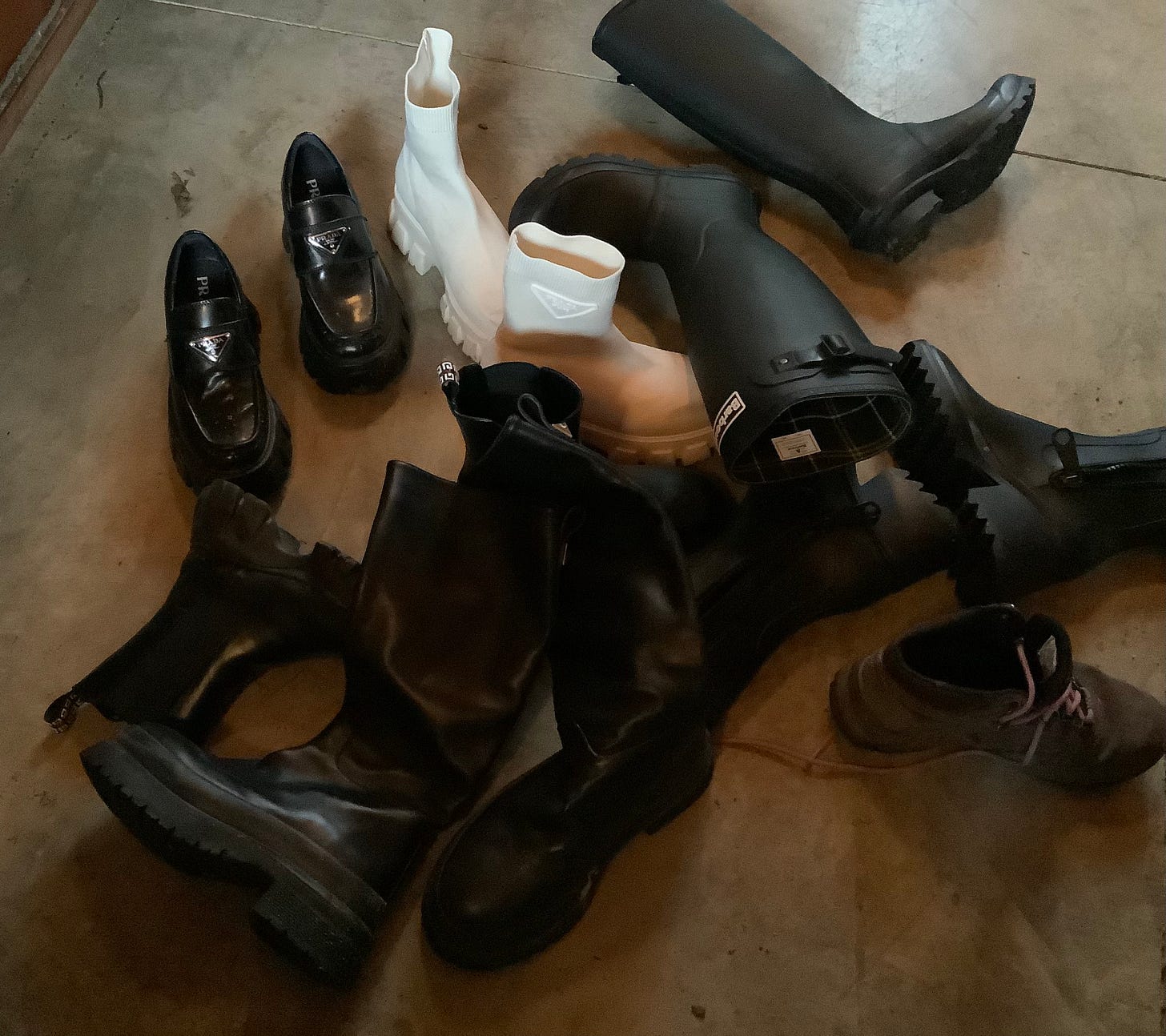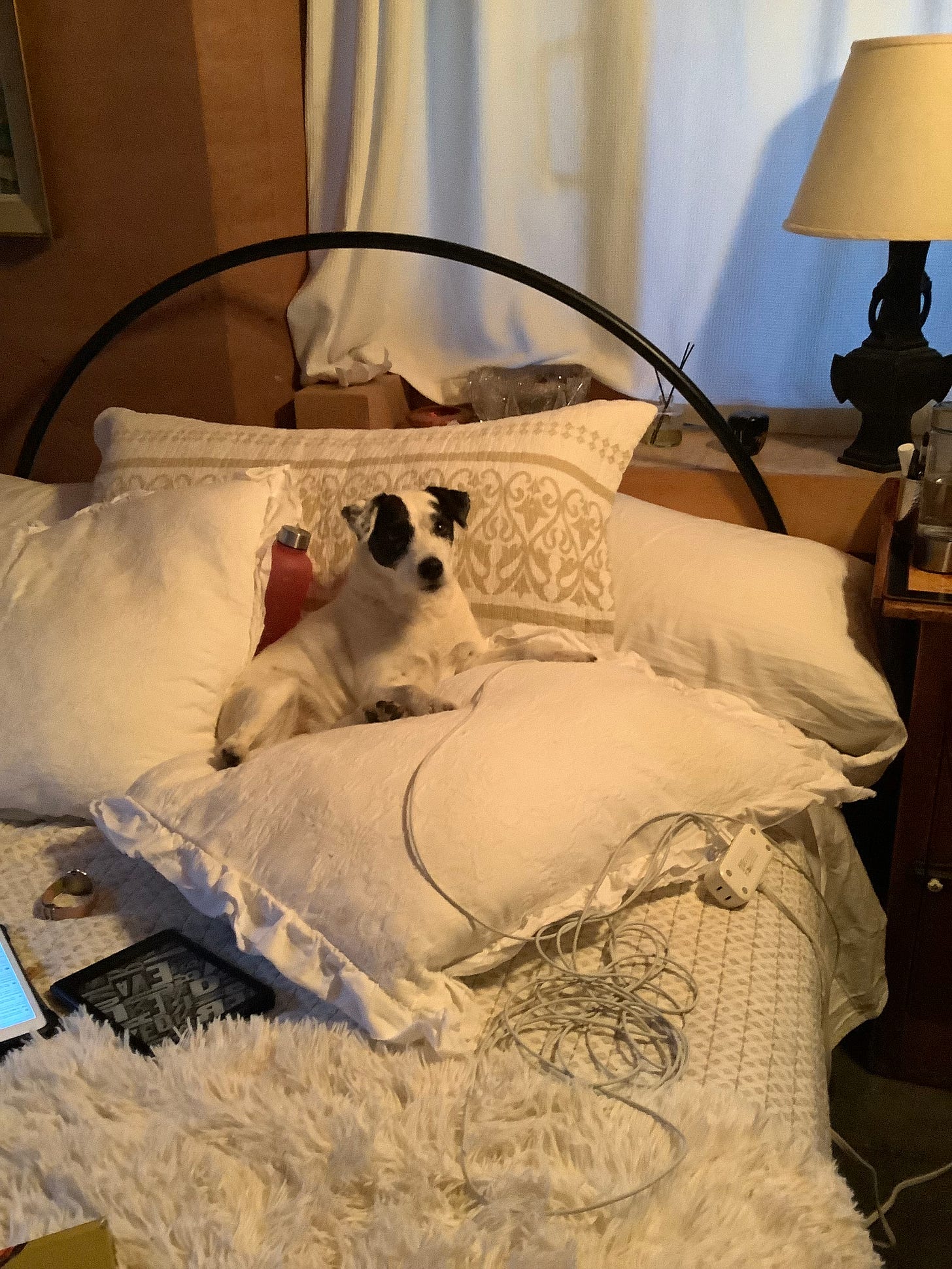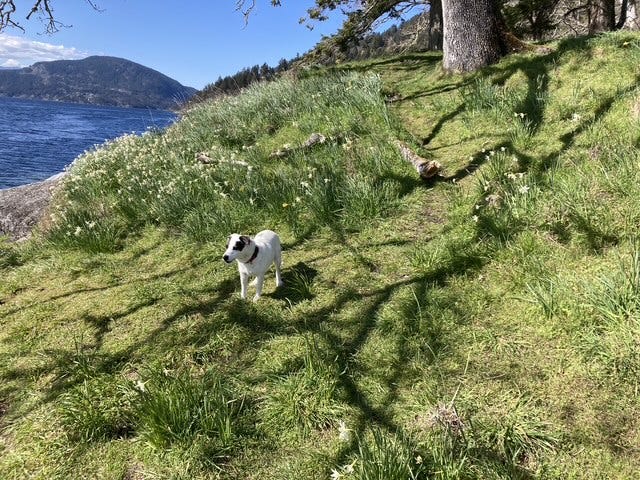(note: I find this embarrassing (and tear-provoking as well as funny), but if you live with a writer, eventually you are going to be written about. Plus this week I am filling in an extensive form meant for the trial of the government and hospital who allowed a CIA cut-out to experiment on my mother and the parent (usually a mother) of 60 others under the stinking beast that was MKUltra. I wish I was kidding. Anyway this is sweet and funny, beautifully written and not entirely wrong.)
The Writer
by James Craig
You’ll know Elizabeth is writing because angels hover above her fingers as she works. If you don’t take the hint and go away immediately, her eyes shoot up above her glasses, head still bent to her screen, zero in on you, and speak. Then you do go away.
Physical books are present, strewn about her bed — her desk being too small — but only because they don’t yet exist digitally. For that she has three iPads and two Kindles and a laptop, wires all over the place because one or all of them are recharging, the apparatus thereof an appalling rat’s nest spilling over the side of the bed and pooling on the floor. The bed is layered up with seven soft throws of varying thicknesses and physical condition for the dog, in the middle of which she (the dog) languishes. Two of the devices are just for notes, and at least one iPad is streaming something live. Last week I found, opening the knife drawer in the kitchen, a mini iPad broadcasting a video-blog originating in Slovenia. Occasionally, as her editor — my function mainly to reengineer her atrocious misuse of commas — I will question a statistic she has employed, and 15 minutes later get a text citing its original source from seven years ago and two citations from other scholars corroborating it, the latest in last month’s quarterly review of a think tank in Adelaide.
Such is Nickson’s milieu. She is never really happy unless she is in front of her keyboard, all else being a distraction. Food, friends, chores, me, and so on. She scorns social engagements because she says the energy she “wastes” throws her off her game. Being by psychological type a disagreeable, sees no purpose in broadcasting it to others, is how she really feels. She would rather be, and in fact must be, at home with her dog, un-caging the ideas orbiting within her Bosch-ian neocortex.
She works in her own genre, the mirror of her personality: restless, spontaneous, impolite. The resolution of this complicated blend of elements is established in her attention to the spiritual side of life. Where all souls congregate as One. She will indeed love her neighbour as herself, just as soon as, if he is reflexively stupid, she has vanquished him on the battlefield of ideas.
“I used to think you were a bit out there,” one of her readers commented (in light of the assertion there may be secret cities inside the earth’s core.) Elizabeth doesn’t eschew a subject simply because by present standards it is preposterous. No real thinker would, seeing as the loudest narratives now driving the culture are so far removed from truth, and the whole place stinking of corruption. Welcome to Absurdistan. If a story rises that links to her world view she will go to work sifting the evidence, do the reading, pile up notes both written and visual, discovering in the process new bold minds, maybe phone one of them, and building alliances with ideas from other fields completely.
Reading Elizabeth, given her locomotive drive and, sometimes, her eccentric position, you might momentarily imagine she is just making stuff up out of fairy dust. This is never true. What has really happened is that she has made an intuitive leap of exuberant logic and you are simply required to stand by while your imagination catches up.
She is a professional writer. Credibility is everything . One’s “loyal following” will quickly evaporate if you strain the customer’s patience. The most important themes underpinning todays world are invidious, which is why so few writers and other artists take them on. The burden of proof is much heavier than for the lies and distortions that command the stage at present. Who will stand still and contemplate the idea, for example, that human trafficking for the purposes of slavery and sexual perversion, especially of children, has now overtaken drugs as the more lucrative activity of international crime syndicates? It is too horrible to contemplate. Yet Nickson asserts it, says the proofs are overwhelming, then presents them. If Justin Bieber is, as even government- subsidized media is beginning to report, the bitch of the revolting P Diddy, why, Nickson goes further and claims that the whole of celebrity culture is a vast cesspool of depravity and Satanic ritual. Cites a half dozen examples. Children are being sacrificed, their blood consumed. Quotes three credible sources, and two maybes. Scores of other “child stars” have also been groomed, she reports —and traces it back to the Rothchilds.
The research done, the time arrives to commit herself to paper, as it were. You disturb her at your peril. Any other call on her attention — even, shockingly, the dog! — is ignored. Stealth missions to the pantry for chocolate, possibly a dairy product. The thinking stops, the creation ensues. She can write 2,000 words in a sitting, and it will be the opposite of stream of consciousness — a considered, spontaneous flow of revelation. Reading it, you will almost feel the air rushing past as she speeds along, ideas elaborating on the wind, a rain of apt sidebars dropping all around, unusual connections, inspired declaration, atoms splitting off forming sub-notions… Just when you think okay now she’s gone TOO far, she’ll drop the coup de grace and you surrender.
She is an antenna, which serves her writerly purposes well, but also makes her sensitive to the exposure arising from publishing her findings, doubly so if they are praised. She likes applause from places high and low, not because her persona needs praising, but because it means her work is provoking a response. Confident indeed of her own intelligence she sometimes thinks she is too smart and will therefore not be understood. A writer fears that, above all else. Any artist does.
Why paint if no one sees the work? Painters who are only recognized after they are dead are few, the famous Vincent being one, who sold exactly one work of art while he was alive, despite having produced 860 oil paintings. He only captured the attention of critics a year before he died. And yet he kept working! Writers, too, are rarely discovered after they are dead. Toiling in a vacuum, bereft of feedback, unsure of their talent — and eventually giving it up and turning away.
(Speaking of sidebars, another wonderful exception — who worked in BOTH fields — and is now the darling of Outsider Art, was the Chicago janitor Henry Darger, who illustrated his epic 15,000 paged “In the Realms of the Unreal”, composed over six decades, with hundreds of surreal artworks, one of them more than 30 feet wide. His landlord found it all after Derger died in 1972. The paintings now can sell for up to $700,000.)
Nickson is an outsider too, and may even be considered reclusive, but is fascinated by the carnival outside the gates. And not all of her subjects are “out there”. She was among the first to expose the lie of climate change, and the perfidious green agenda in general, some 20 years ago. Rarely going there any more, the argument now won, she has transitioned over to the way government uses that agenda to deliberately keep its citizenry in rags and badly fed, arguing that we would otherwise be at least twice as prosperous.
So attached to data and rational thought when she makes these arguments, she may short out on detail and physically collapse. The last time this happened I suggested she write, instead, about the cat
Every morning, immediately after waking up, without fail, rain or shine or even snow, Elizabeth and the cat, at the cat’s command, make their way down to the creek, she with her coffee and an iPad, Fitch exaggeratedly alert for any possible interloper, chiefly the dog. A two minute walk may take 15, I am told. I’ve set up a couple of fir rounds down there, and keep it raked. It’s quite a sight, Elizabeth in her dressing gown and rubber boots, and I think in the winter two dressing gowns, “literally the crazy old woman wandering in the woods” (her words) and Fitch just as cute. I’ve spotted them a few times over the years, when I have preceded them on a warm summer early morning, down in the ravine myself but far up the creek from their territory, on my way back. Not them actually, just her, hair unbrushed, shrouded in giant robes, the definition of charming. I did also spot the cat once, lurking in the ferns. They have their own language. Elizabeth sometimes returns with a lugubrious tale of what has happened between them down at the stumps, the cat perhaps having gone off on her own up to the log suspended across the stream, and looking back at her, or the cat in a protracted stare-down into her own reflection at a pool.
She was startled. “Why would anyone care about THAT?” she asked, as though I were nuts.
Similarly she won’t be writing about her wardrobe, overflowing with classic tops and jackets from when she had her own “personal shopper” at Holt Renfrew in Toronto, nor the vast pharmaceutical of natural medicines and medical equipment in a dedicated chest of drawers; nor the 11 pairs of block-heeled rubber shoes in the front hall. Her contention that a house is a closet— “I mean, isn’t that what a house is, really?”, and the ways in which that belief expresses itself at her end of the house— is beside the point. The subject of her now ancient, scraped-up Mercedes Benz, bought second-hand nine years ago with money from a rich stalker, as a token of his remorse, will not arise. The silver bars he threw over the fence down by the pump house is also out of bounds. The extent to which her dog, Pan, regulates her mistress’ every non-working moment, the ever-renewed plush blankets and throws they share, the elaborate dietary lengths gone to to satisfy the dog’s (by now) rarified tastes ….
All is subsumed in Elizabeth’s passion for and fascination with the distorted politics and social catastrophes of the day at hand.
The platform for which she now writes, Substack, might have been created specifically with Nickson in mind, so exactly does it suit her nature. Uncensored, unlimited as to frequency or length of copy, weekly earnings automatically deposited in her bank account, and generating continually updated graphs of where her readers live. In a single stroke the old model of writing for magazines and writing books is thus destroyed, where anyway you were paid too late and too little, or nothing at all. Now, if she is cruelly hated on by a reader, she simply bans the unfortunate fool for life — presto — yet is unpredictably charmed by opposing views when they are expressed colourfully. Substack is the Wild West of reportage, the Wyat Earp of dispensed justice, where virtue and vice stand off directly, and if a dead body lies in the street at the end, so much the better. You can manoeuvre content there like you could never do in traditional print media, dropping, say, an Instagram video directly into your text. Recently she inserted a ten second video of a distraught woman in a city park ranting about just having heard a container-full of humans down in Vancouver’s shipping yards, pounding on the metal walls from inside. Elizabeth then looped, after two sentences, to another video of a panel of cops at a press conference, shot a day later, announcing the results of their investigation into…a container full of trafficked women and children down at the docks in False Creek. Unassailable.
She got her start in the short essay, an ancient form which Substack has revived (education via TikTok somehow not satisfying everyone’s needs), when she was offered a slot at Canada’s once-prestigious, nationally distributed newspaper, The Globe and Mail — at about the time I met her, 23 years ago. They wanted a weekly opinion column. The landscape for such had been dominated in that country for decades by superannuated old dogs aggressively out of touch with the rest of the world but prepared to declaim without pause on the minute differences between the policies of the only two political parties that had vied for power in Canada for 150 years. Elizabeth, who had been working abroad for 20 years at the highest journalistic level, had more international exposure than all of them put together, forewent the numbing nuances of the national political scene and wrote instead of the unheard-of social trends percolating in the side streets of the Western world, and which would emerge ten years later as the nascent first snortings of Woke ideology. The leftist culture that dominated the entire social and artistic life of North America at that time was just beginning to stink, bloated by subsidies and blind to all but its own preening, passed off as social activism on the street and performed as art by the elite. Righteous outrage against the establishment was becoming whiney and self-important. This all unveiled itself in the pre-digital age, when newspapers still hired actual reporters and made a fortune from advertising. Big media itself was becoming part of the problem, promoting the tear- down of the structures that built civilization, and all the major institutions were being colonized by European-educated socialists and malcontents. These were the themes of which she wrote — the devolution of the novel and cinema from story making into dirge, the universities turning away from teaching how to think to what to think.
She chronicled the grievance-based leftist creep over the whole battery of institutions that govern us, including the one she was a part of, and inevitably became a little too hot to handle, and was driven out by the gang of middle managers leading the charge towards compliance and mediocrity in that field.
She left just in time, it turned out, because journalism, as practised by newspapers and television, was dying, and she got a head start in internet based new media years before her peers.
I’ve known half a dozen serious writers pretty well, and about the same number of professional visual artists, and one of the most interesting things about them all is how the energy they bring to their daily lives, the postures, the style, is the exact same energy you will find in their work, and essential to explaining the work. Years ago in Victoria I saw a little girl on a tricycle beetling down the sidewalk, one hand on the handle bars and the other raised to eye level holding the opened comic book she was reading as she sped along. That’s Elizabeth. The appetite for mental input, the way the girl peddled confidently forward —not carelessly, exactly, because she was in complete control — but with abandon, and great purpose, very much a wholeness rather than a collection of unfigured-out parts.
Nickson is a study in the way mind and matter commingle, representing the outer limits of each. She breaks out of the house unpredictably: dog starts barking, front door slams, a lot more barking, car hurtles down driveway and skids to a stop in the gravel in front of the gate, dog escapes now open car door, barking, barking, circus turns left up the hill to the trailhead of the 1500-foot mountain they’ve already climbed twice this week. Alternately she turns right, towards the Provincial Park down in the valley, a 30 minute hike up and across a steep ridge down to a tiny clamshell beach, strips down to a bathing suit and rubber shoes for the barnacles, and walks into the sea. In winter the dog declines to join her, but the winter swim only lasting five minutes the dog somehow survives the separation; the rest of the year the two of them paddle around together up to their necks for 40 minutes until the seal finally pokes ITS head up to check them out and it being a very big seal and Elizabeth being not only little but bearing what she knows is an irrational fear the seal might want to eat the dog, they come to shore.
There are periods when a perfect balance occurs between these adventures in nature and the necessity to write, lasting as long as a month, the psychic lift of the former propelling the story making, which in turn then washes back over her physical self, refreshing it, kindling other appetites, the reading of novels — a break for her — or she may get busy in the kitchen with sauces and doughs and braised fats, the juicer violently juicing. Or maybe collect all her inherited silverware and set up a polishing station on the kitchen counter, the one and only cleaning ritual she performs without the moaning and groaning that otherwise accompanies the “boring” chores normal people perform. As you will have guessed, such doings in the kitchen are liable and in mid flight to be suddenly abandoned, all the makings left in place, to be picked up again hours later or maybe tomorrow, if she needs to write.
A profound and sudden lull then falls over the living portion of our house, and Elizabeth once again has disappeared
.
Welcome to Absurdistan is not pay-walled, but if you have been here a while, please consider an inexpensive annual subscription. The four years ahead are going to blow off the heads of our sickening corrupt elites and the structure they have built to impoverish us and benefit them. Absurdistan is 100% here for it.
The happiest of the New Year to Absurdistan’s readers. You inspire me. You are the next thing. There is no stopping it now.
You can buy me a coffee here
or
for those who don’t hate paypal, paypal me here
or
Become a Founding member here
Subscribed
Elizabeth Nickson was trained as a reporter at the London bureau of Time Magazine. She became European Bureau Chief of LIFE magazine in its last years of monthly publication, and during that time, acquired the rights to Nelson Mandela’s memoir before he was released from Robben Island. She went on to write for Harper’s Magazine, the Guardian, the Observer, the Independent, the Sunday Telegraph, the Sunday Times Magazine, the Telegraph, the Globe and Mail and the National Post. Her first book The Monkey Puzzle Tree was an investigation of the CIA MKULTRA mind control program and was published by Bloomsbury and Knopf Canada. Her next book, Eco-Fascists,,How Radical Environmentalists Are Destroying Our Natural Heritage, was a look at how environmentalism, badly practiced, is destroying the rural economy and rural culture in the U.S. and all over the world. It was published by Adam Bellow at Harper Collins US. She is a Senior Fellow at the Frontier Center for Public Policy, fcpp.org. You can read in depth policy papers about various elements of the environmental junta here: https://independent.academia.edu/ElizabethNickson.
Her essay on the catastrophic failings of Canada's CBC is included in Michael Walsh’s Against the Corporate Media, 42 Ways the Press Hates You, published in September 2024









Brilliant, funny, original.
Elizabeth Nickson is a writer of rare and true genius.
I am convinced. Please join those of us who seek to unravel the Federal funding of NGO’s that bill for maintenance & care of unaccompanied minors that have arrived since January, 2021. If the Feds are paying large bills to NGOs, they should be able to produce pristine records of the current location for each child. Pressure should be brought on the NGOs to - without resistance - quickly either give up all names & locations…or say they don’t know. If the latter, their revenue stream & status with the Federal Government should end immediately.
https://www.congress.gov/118/meeting/house/117320/documents/HMKP-118-GO00-20240515-SD004.pdf
It is unfathomable to even contemplate that even Church-linked NGOs would claim “privileged” status from their Principal - the US Government. At a minimum, an IG audit should sample a test group during the first 100 days following the Inauguration.